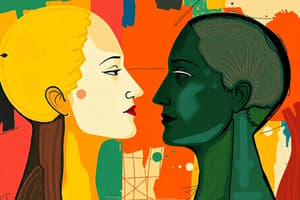Podcast
Questions and Answers
What concept does the term 'demos' refer to in classical democracy?
What concept does the term 'demos' refer to in classical democracy?
- Government
- Trade
- Power
- People (correct)
What form of democracy allows the people to rule directly without mediation?
What form of democracy allows the people to rule directly without mediation?
- Participatory democracy
- Representative democracy
- Direct democracy (correct)
- Egalitarian democracy
Which event is associated with the birth of modern democracy?
Which event is associated with the birth of modern democracy?
- The medieval period
- The Enlightenment (correct)
- The industrial revolution
- The Roman Empire
Which theory of democracy focuses on reducing inequalities within a society?
Which theory of democracy focuses on reducing inequalities within a society?
What is a key characteristic of representative democracy?
What is a key characteristic of representative democracy?
What aspect does participatory democracy emphasize?
What aspect does participatory democracy emphasize?
What is a common misunderstanding of the concept of democracy?
What is a common misunderstanding of the concept of democracy?
What indicates the term 'plebiscitary democracy'?
What indicates the term 'plebiscitary democracy'?
What characterizes meritocratic democracy?
What characterizes meritocratic democracy?
What does economic democracy emphasize as crucial for a democratic system?
What does economic democracy emphasize as crucial for a democratic system?
Which aspect does liberal democracy prioritize?
Which aspect does liberal democracy prioritize?
How is procedural democracy defined?
How is procedural democracy defined?
What distinguishes radical democracy from other forms?
What distinguishes radical democracy from other forms?
What does consensus democracy advocate for?
What does consensus democracy advocate for?
Which of the following is a characteristic of majoritarian democracy?
Which of the following is a characteristic of majoritarian democracy?
What contrasts deliberative democracy from other democratic theories?
What contrasts deliberative democracy from other democratic theories?
Flashcards
Ancient Democracy
Ancient Democracy
Democracy in ancient Greece and Rome, emphasizing debates but excluding many. Early forms of democracy.
Direct Democracy
Direct Democracy
A system of democracy where citizens directly participate in decision-making, without elected representatives.
Representative Democracy
Representative Democracy
A system where citizens elect representatives to make decisions on their behalf.
Participatory Democracy
Participatory Democracy
Signup and view all the flashcards
Egalitarian Democracy
Egalitarian Democracy
Signup and view all the flashcards
Modern Democracy
Modern Democracy
Signup and view all the flashcards
Medieval Democracy
Medieval Democracy
Signup and view all the flashcards
Theories of Democracy
Theories of Democracy
Signup and view all the flashcards
Meritocratic Democracy
Meritocratic Democracy
Signup and view all the flashcards
Economic Democracy
Economic Democracy
Signup and view all the flashcards
Liberal Democracy
Liberal Democracy
Signup and view all the flashcards
Procedural/Minimal Democracy
Procedural/Minimal Democracy
Signup and view all the flashcards
Deliberative Democracy
Deliberative Democracy
Signup and view all the flashcards
Radical Democracy
Radical Democracy
Signup and view all the flashcards
Consensus Democracy
Consensus Democracy
Signup and view all the flashcards
Majoritarian Democracy
Majoritarian Democracy
Signup and view all the flashcards
Study Notes
Theories of Democracy
- Democracy is not a singular concept; it's a combination of various theories.
- Many theories have been proposed, leading to confusion.
- Different theories may not be compatible.
- The concept of democracy is also influenced by moral considerations.
History of Democracy
- Ancient/Classical Democracy: Derived from Greek words "demos" (people) and "kratos" (power).
- Athenian and Roman democracies existed.
- Ancient democracies focused on debates.
- They were exclusionary by today's standards but considered inclusive in their time.
Medieval Democracy
- Democracy was practiced in city-states.
- Key characteristics of medieval democracy included a small scale and trade.
Modern Democracy
- The Enlightenment and the American/French Revolutions were pivotal in the creation of modern democracy.
- Technological advancements, broader education, and economic changes enabled broader participation among masses following these revolutionary periods.
Theories of Democracy Focusing on the Form of Participation
-
Direct Democracy: Characterized by active self-rule, direct citizen participation, and no mediating bodies.
-
Plebiscitary democracy is a type of direct democracy.
-
Representative Democracy: Citizens elect representatives to act on their behalf. It's characterized by indirect participation and significant mediation between the people and the decision-making process.
-
Parliamentary democracy is a type of representative democracy.
-
Participatory Democracy: Encourages direct and indirect citizen participation in public affairs.
-
Emphasizes the level and opportunities for participation, such as democratic conventions and budgeting.
Theories of Democracy Focusing on Outcome of Politics
-
Egalitarian Democracy: Aims to reduce inequalities. The political system needs to correct inequalities produced by the economic system.
-
Equality among citizens is essential for a democratic system.
-
Equality includes different dimensions like economic, political equality, etc.
-
Meritocratic Democracy: Seeks to produce equal opportunity leading to the best people in the most important positions. Similar to egalitarian democracy, the political system aims to address inequalities caused by the economic system.
-
An equally fair playing field is vital for a meritocratic democratic system.
-
It also considers different dimensions of equality (as in the previous point on egalitarian democracy).
-
Economic Democracy: Focuses on maximizing the welfare of citizens.
-
The political system needs to fix imperfections of the economic system.
-
The more well off citizens are the more democratic the system becomes.
Theories of Democracy Focusing on the Institutional System/Process of Decision-Making
-
Liberal Democracy: Emphasizes constraints on government power.
-
Dispersed power, prevents a single entity from dominating decisions, and prevents consequential events.
-
Checks and balances are vital.
-
It's one of the most prevalent democratic models today, with other models incorporated.
-
Procedural/Minimal Democracy: Primarily focuses on elections to determine who rules. Elections are the key process in determining political decisions, and checks and balances are less essential.
-
Illiberal democracy is an example of a different model compared to liberal democracy.
-
Deliberative Democracy: Decisions are made through reasoned discussion.
-
Deliberation is valued over voting. Finding compromise and consensus is crucial.
-
Radical Democracy: Citizens are involved in every aspect of life; the private sphere is erased. All decisions are collectively determined and controlled. A key link to socialism is worth highlighting.
-
Consensus Democracy: Political decisions aim to include all affected groups.
-
Increased inclusion enhances democracy.
-
Minorities need to have power.
-
Compromise may be more common than complete consensus.
-
Majoritarian Democracy: Focuses on the will of the majority.
-
Very little focus on inclusion.
-
Minorities have little to no power.
-
Effectiveness and performance of the system is prioritized.
Studying That Suits You
Use AI to generate personalized quizzes and flashcards to suit your learning preferences.
Related Documents
Description
Explore the various theories of democracy and their historical evolution from ancient to modern times. This quiz covers key concepts, including classical, medieval, and modern democratic practices and their implications. Understand how moral considerations and historical events shaped the democratic landscape.




